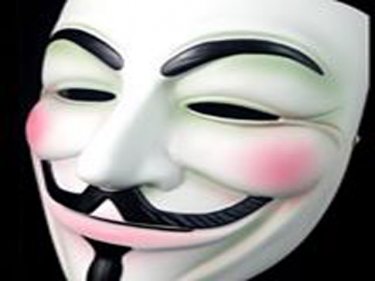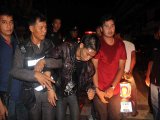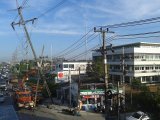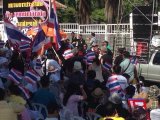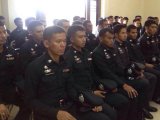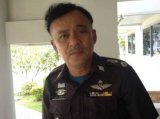PHUKET: Hackers claiming to be from the notorious Anonymous collective have stepped up attacks across South-East Asia, infiltrating websites in Singapore and the Philippines.
Messages were posted on Sunday on the web-pages of at least five government agencies in the Philippines, urging the public to join a mass protest against corruption.
''To the corrupt - fear us,'' the message warned.
On its Facebook page Anonymous Philippines claimed to have hacked more than a dozen government websites, including the Office of Ombudsman, where clicking on a message there redirected to a post lambasting the government.
''The government, in many ways, has failed the Filipino citizens . . . let us remind the government that fairness justice and freedom are more than just words,'' it read.
The post calls for the public to join a November 5 protest against corruption in Manila.
Philippine president Benigno Aquino is facing the biggest crisis of his three-year rule over the alleged misuse of public funds by lawmakers.
Last week Mr Aquino, who was elected on a platform of curbing corruption, was forced to deny allegations of bribery, declaring on national television ''I am not a thief.''
Websites have been hacked in the Philippines previously over diplomatic disputes and in September 2012 by those angry at a restrictive cybercrime law.
Roy Espiritu, an official in the government's science department's IT section, said forensic work was being done to try to trace the hackers.
Those who deface government websites could face up to six months jail, he said.
But Mr Espiritu said government agencies maintain individual websites, making it difficult to secure them from hacking.
In Singapore, the financial hub where the traditional media is tightly controlled, hackers have been active over the past week, prompting government agencies to be on alert for wider cyber attacks.
On Friday the blog of a journalist on the website of the pro-government Straits Times newspaper was hacked by a group opposing recently introduced licensing rules for news websites in Singapore.
Using the name ''Messiah'' the message claimed the journalist had distorted ''our words and intentions'' in a blog about a YouTube post the day before in which a person claiming to speak for Anonymous warned that Singapore could suffer financial losses from ''aggressive cyber intrusion.''
''The primary objective of our invasion was to protest the implementation of the internet licensing framework by giving you a sneak peak of the state of your cyberspace if the ridiculous, communistic, oppressive and offensive framework is implemented,'' the message warns.
The video warns the group has faced more secure corporations such as the FBI and urges ''fellow Singaporean sisters and brothers'' to start a public protest by dressing in black and red on November 5 and blacking out their Facebook profile pictures.
The original posting was taken down but it has been copied and can be still viewed online. Reacting to the YouTube post, Singapore???s Infocomm Development Authority said: ''We are aware of the video and the police are investigating the matter.''
The Straits Times reported Singapore's IT Security Incident Response Team had been put on alert following the YouTube posting and hacking of the newspapers' site.
Under new rules from June 1 websites in Singapore with at least 50,000 unique visitors from within Singapore a month require annual licensing.
The rules prompted anger among the city-state's robust blogging and social media community. Singapore announced a plan last week to spend US$105 million over the next five years to bolster research and human resources to make computer networks more secure against online attacks.
Anonymous, a loosely associated international network of activists and hackers, is known for highly publicised cyber-attacks around the world since it was established in 2003.
Supporters have called the group ''freedom fighters'' and ''digital Robin Hoods'' while critics have described them as a ''cyber-lynch mob.''
In 2012, Time magazine called Anonymous one of the ''100 most influential people'' in the world.
Messages were posted on Sunday on the web-pages of at least five government agencies in the Philippines, urging the public to join a mass protest against corruption.
''To the corrupt - fear us,'' the message warned.
On its Facebook page Anonymous Philippines claimed to have hacked more than a dozen government websites, including the Office of Ombudsman, where clicking on a message there redirected to a post lambasting the government.
''The government, in many ways, has failed the Filipino citizens . . . let us remind the government that fairness justice and freedom are more than just words,'' it read.
The post calls for the public to join a November 5 protest against corruption in Manila.
Philippine president Benigno Aquino is facing the biggest crisis of his three-year rule over the alleged misuse of public funds by lawmakers.
Last week Mr Aquino, who was elected on a platform of curbing corruption, was forced to deny allegations of bribery, declaring on national television ''I am not a thief.''
Websites have been hacked in the Philippines previously over diplomatic disputes and in September 2012 by those angry at a restrictive cybercrime law.
Roy Espiritu, an official in the government's science department's IT section, said forensic work was being done to try to trace the hackers.
Those who deface government websites could face up to six months jail, he said.
But Mr Espiritu said government agencies maintain individual websites, making it difficult to secure them from hacking.
In Singapore, the financial hub where the traditional media is tightly controlled, hackers have been active over the past week, prompting government agencies to be on alert for wider cyber attacks.
On Friday the blog of a journalist on the website of the pro-government Straits Times newspaper was hacked by a group opposing recently introduced licensing rules for news websites in Singapore.
Using the name ''Messiah'' the message claimed the journalist had distorted ''our words and intentions'' in a blog about a YouTube post the day before in which a person claiming to speak for Anonymous warned that Singapore could suffer financial losses from ''aggressive cyber intrusion.''
''The primary objective of our invasion was to protest the implementation of the internet licensing framework by giving you a sneak peak of the state of your cyberspace if the ridiculous, communistic, oppressive and offensive framework is implemented,'' the message warns.
The video warns the group has faced more secure corporations such as the FBI and urges ''fellow Singaporean sisters and brothers'' to start a public protest by dressing in black and red on November 5 and blacking out their Facebook profile pictures.
The original posting was taken down but it has been copied and can be still viewed online. Reacting to the YouTube post, Singapore???s Infocomm Development Authority said: ''We are aware of the video and the police are investigating the matter.''
The Straits Times reported Singapore's IT Security Incident Response Team had been put on alert following the YouTube posting and hacking of the newspapers' site.
Under new rules from June 1 websites in Singapore with at least 50,000 unique visitors from within Singapore a month require annual licensing.
The rules prompted anger among the city-state's robust blogging and social media community. Singapore announced a plan last week to spend US$105 million over the next five years to bolster research and human resources to make computer networks more secure against online attacks.
Anonymous, a loosely associated international network of activists and hackers, is known for highly publicised cyber-attacks around the world since it was established in 2003.
Supporters have called the group ''freedom fighters'' and ''digital Robin Hoods'' while critics have described them as a ''cyber-lynch mob.''
In 2012, Time magazine called Anonymous one of the ''100 most influential people'' in the world.

